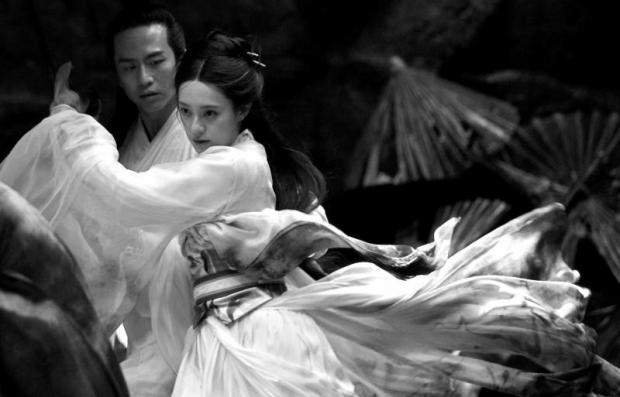It rains incessantly in Zhang Yimou's Shadow, a monochromatic palace-intrigue-and-martial-arts high rhapsody set in a perpetual monsoon. Everything is grey, brown, black and white, a solemn palette befitting a solemn story interspersed with a blur of sword-fighting where warriors wield blades and umbrellas as if they were painting calligraphy.
Certain audiences will remember a time when martial arts movies were a trashy delight in our cultural upbringing -- unpolished and sincere, cheap and addictive. The gentrification of chopsocky officially began in 2000 with Crouching Tiger, Hidden Dragon, Ang Lee's phenomenal Oscar-winner that defied the odds to become a crossover hit. That film fine-tuned the unruly edges of the good ol' wuxia flicks and lent an arthouse sheen -- though without sacrificing the original penchant for theatricality and hyperbole (people flying, for instance). Then Zhang Yimou, who began his career as an examiner of China's rural woes, took the neo-wuxia to another level of seriousness and bombast in Hero, House Of Flying Daggers and Curse Of The Golden Flower. Borrowing from history and unabashed in their stylisation, they all shared the same obsession of making martial arts beautiful.
Shadow, sculpted in that mould, is a fine entry among that uneven batch. The film's rain-soaked moodiness has genuine gravity and the fight choreography is inventive. The melodrama of court power, soldierly sacrifice and sensuous jealousy comes in a potent mix of emotion and blood. And the setting of flooded canyons and epic gorges -- heavily computer generated -- is stunning. All of this should entice impatient martial arts fans to stick with the measured pacing and Byzantine palace machinations.
Set in the 3rd century during the Three Kingdoms era, Shadow hinges on the rivalry between the cities of Pei and Jing. The king of Pei is a coward who avoids confrontation even though his advisers urge him to launch an attack on the rulers of Jing. The narrative focuses on the commander (Chao Deng) and his secret manoeuvrings (so secret that he hatches them in a vast, rocky cavern that's somehow hidden behind a screen panel) to defeat the Jing general in the land across the gorge -- a general renowned for his fearsome ability to kill anyone within three moves. The commander practises his sword moves with his master and the master's wife, a serene madam (Li Sun) who has devised a trick of turning an umbrella into a fatal weapon. In the unceasing drizzle, they brandish their blades and dance their elegant dance on ground adorned with a giant yin/yang emblem.
This is an oversimplification of what actually happens in the film, which slowly deals out decoys and secrets anchored in the concept of "a shadow" -- a body double used by high-ranking officials to bamboozle their enemies.
There's also a thread about the king's plan to marry off his sister in a bid to stabilise the balance of power. Shadow seems to hint at the zeitgeist of having strong female characters who own their destinies in a world overstuffed with warring, bloodthirsty men. But it's a hint that's not entirely developed and it's the men who run the show. (In this regard, it shows that Crouching Tiger, Hidden Dragon, with its feisty swordswoman played by a young Zhang Ziyi, was ahead of its time.)
At times taking itself a little too seriously, Shadow builds up to a climactic battle scene that is quite remarkable in its rhythm, choreography and obsession with combining beauty and deadliness, or water with blood and tears -- the literal yin/yang duality heavily suggested throughout the film.

